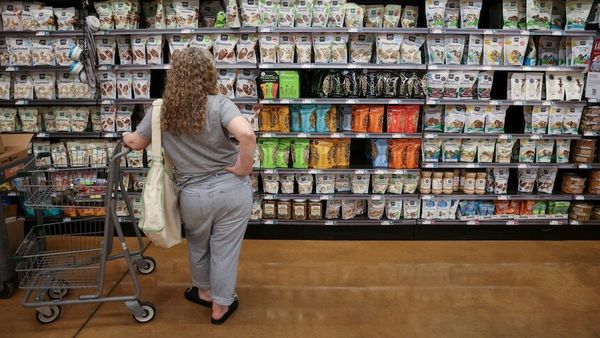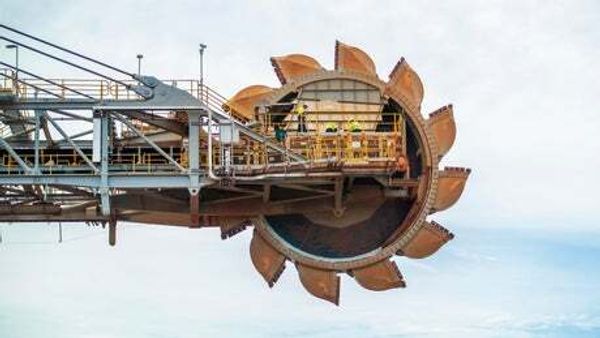The Australian share market has ended a three-day winning streak as tumbling commodity prices pulled down heavyweight miners and China's zero COVID-10 policy hammered its economy.
In the first hour of trade, the market lost as much as 1.7 per cent of its value, before ending off its lows.
The All Ordinaries index closed down 0.7 per cent to 6,798, while the ASX 200 index dropped 0.7 per cent to 6,606, with most sectors in the red led down by miners, education firms, industrials, financials, and oil stocks.
On the rise were consumer discretionary firms, healthcare stocks, real estate and utilities.
Big miners fell as iron ore prices tumbled 7.6 per cent to $US100.45 a tonne as investors worried about a global economic slowdown caused by the war in Ukraine and rising interest rates.
The slump extended to other industrial metals because of problems in China's real estate industry.
The best performers on the ASX 200 index was buy now, pay later company Zip (+5.6 per cent) and technology firm WiseTech Global (+4.1 per cent).
The worst performer was investment house Pendal Group (-7.8 per cent) as investors withdrew their money from the company's funds.
Pendal's funds under management slumped to $111 billion in the June quarter, down from $124.9 billion over the March quarter because of market volatility and fear of recession.
The Australian dollar dropped to 67.23 cents at 4:30pm AEST, down 0.4 per cent, after surging to nearly 68 US cents yesterday as the national unemployment rate fell to 3.5 per cent, the lowest in nearly 50 years.
The Commonwealth Bank predicted that the Reserve Bank will raise interest rates again by half a percentage point in both August and September, while Westpac is forecasting a 0.5 percentage point rise in August and a 0.25 percentage point lift in September.
China slowdown
China's tough zero COVID policy saw its economic growth slow sharply in the second quarter.
The Chinese economy expanded by just 0.4 per cent from the same time last year, according to China's National Statistics Bureau, as widespread lockdowns to curb record COVID cases hit factory production and consumer spending.
That was a steep slide from the 4.8 per cent annual growth rate over the year to March.
Gross domestic product was expected to expand by 1 per cent over the April to June quarter from a year earlier, according to a Reuters survey of economists.
GDP contracted by 2.6 per cent over the quarter, compared to the first few months of the year.
China's economy grew by 2.5 per cent over the first half of 2022.
A Reuters poll forecast China's growth could slow to 4 per cent in 2022, far below the official growth target of around 5.5 per cent.
Rio Tinto warning
Global miner Rio Tinto said it was facing worker shortages in Western Australia because of rising COVID-19 cases at its mines in the Pilbara, in north-west Western Australia.
It also warned that rising inflation would eat into its earnings in the second half of the financial year.
In its quarterly production, Rio said that an increase in coronavirus cases at its Pilbara operations had led to "elevated levels of unplanned absences", which saw iron ore shipments drop by 2 per cent over the first half of the 2022 financial year.
Over the second quarter, iron ore shipments rose nearly 5 per cent to 79.9 million tonnes from the same time a year ago.
It expects to ship between 320 million to 335 million tonnes of the steel-making ingredient this year.
Rio said prices for commodities decreased over the second quarter amid growing recession fears and a decline in consumer confidence.
"The economic outlook is weakening due to the Russia-Ukraine war, tighter monetary policy to curb rising inflation, and targeted COVID-19 restrictions in China."
"Trade disruptions, food protectionism and the global focus on securing energy supplies continue to put pressure on supply chains, which will need to be significantly eased before inflationary pressures subside," the big miner said in its production report.
Rio Tinto's shares fell 2.9 per cent to $93.27, while rival BHP fell 3.5 per cent to $36.10, and Fortescue Metals Group lost 6.2 per cent, to $16.33.
Rex moves into FIFO
Regional airline Regional Express is expanding into the mining industry by buying fly-in, fly-out flight provider National Jet Express, for $48 million.
National Jet Express made revenue of $142 million in 2021, and is the regional services arm of Cobham Aviation Services Australia.
The airline provides fly-in, fly-out services in Western Australia and South Australia, and also operates freight services from Sydney to Adelaide, Brisbane, Melbourne and the Gold Coast, and air charter services in Papua New Guinea.
Rex said it expects strong growth in FIFO services.
Regional Express shares rose 2.9 per cent to $1.25.
Wall Street jitters
US stocks have fallen back as surging inflation in North America kept investors nervous and amid weaker-than-expected earnings from a Wall Street titan.
North America's biggest bank, JP Morgan Chase, reported a 28 per cent fall in second-quarter profit to $US8.6 billion ($12,75 million) and suspended share buybacks.
Earnings from investment banking slid by nearly two-thirds.
Chief executive Jamie Dimon warned that geopolitical tension, high inflation, waning consumer confidence, the withdrawal of stimulus, and the war in Ukraine, "are very likely to have negative consequences on the global economy sometime down the road".
Rival bank Morgan Stanley saw investment bank revenue fall by half as the war in Ukraine hit mergers and acquisitions income.
All three major indexes were sold off sharply before paring their losses.
The Dow Jones index dropped 0.5 per cent to 30,630, the S&P500 fell 0.3 per cent to 3,791, while the Nasdaq Composite index ended flat, up 0.03 per cent, to 11,251.
Producer Prices
Data released overnight showed that prices at the farm and factory gate rose more than expected in June in the US.
The US Producer Price Index rose 1.1 per cent over June and by 11.3 per cent on an annual basis.
That followed official data on Wednesday which showed that US consumer prices jumped 9.1 per cent over the year to June, up from May's 8.6 per cent annual rise.
The big surge in prices could see more aggressive interest rate rises from the US Federal Reserve, with a 1 percentage point increase in rates a possibility at the US central bank's meeting this month, according to Atlanta Federal Reserve president Raphael Bostic.
The Federal Reserve raised interest rates by 0.75 percentage points last month.
Adding to the list of central banks that have raised interest rates this week were the Monetary Authority of Singapore and the Philippines central bank.
The US dollar soared to a 20-year high as spot gold slumped to near a one-year low.
"The Fed probably needs to temper people's expectations in terms of what they can do," said Eddie Cheng at Allspring Global Investments.
"In the past hiking cycle, we have observed that inflation kept rising during the hiking cycle … It takes time for monetary policy to affect inflation."
Mr Cheng said riskier assets will be the "collateral damage" in the Federal Reserve's attempts to rein in inflation.
European stocks
The European Commission cut its forecasts for euro zone economic growth in 2022 and raised its estimates for inflation.
In London, the FTSE 100 index fell 1.6 per cent to 7,040, the DAX in Germany lost 1.9 per cent to 12,520 and the CAC 40 in Paris dropped 1.4 per cent to 5,915.
Oil prices decreased as traders expected a large interest rate rise by the Fed to curb demand for fuel.
Fuel prices have tumbled over the past two weeks on recession concerns, despite a fall in crude and refined products exported from Russia because of Western sanctions, and supply disruption in Libya.
Brent crude pared its losses and settled down 0.5 per cent to $US99.10 a barrel overnight.
Spot gold fell 1.5 per cent to $US1709.46 an ounce.
ABC/Reuters










